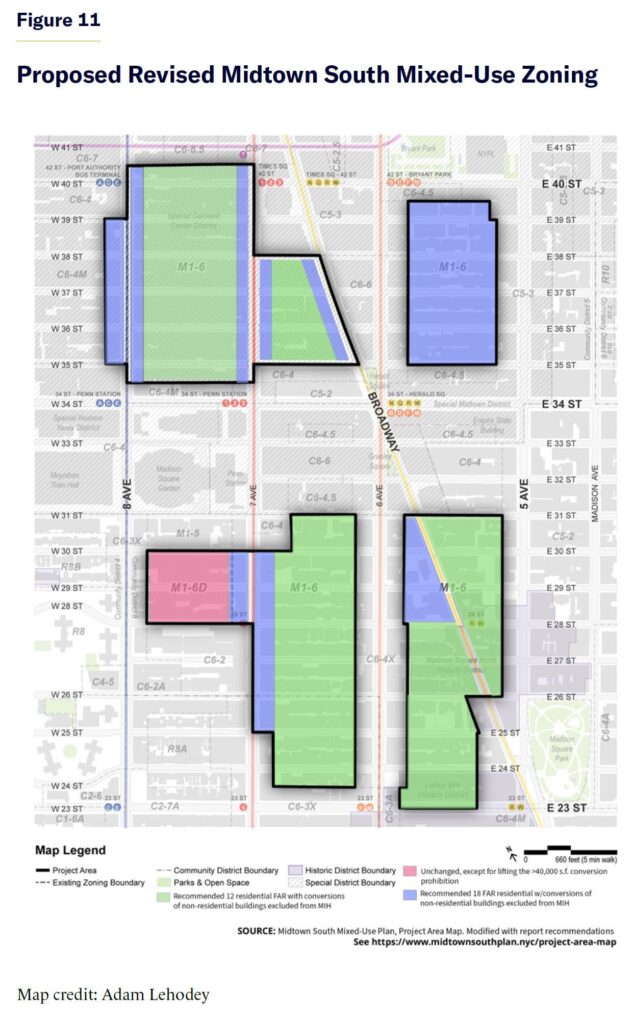Midtown South Rezoning: A New Chapter for Manhattan’s Commercial Core
The New York City Council’s land-use committee has recently endorsed the Midtown South rezoning initiative, a transformative plan set to redefine one of Manhattan’s most dynamic commercial hubs. This proposal not only aims to upgrade the district’s infrastructure and expand development opportunities but also integrates a comprehensive community investment strategy to uplift local businesses and public spaces. Proponents argue that this rezoning will catalyze economic vitality and meet long-standing neighborhood demands, though some residents express concerns about potential effects on housing affordability and the area’s distinctive character. The full City Council is expected to vote on the measure in the near future.
Strong Committee Backing Propels Midtown South Rezoning Forward
Securing decisive approval from the city council’s land-use committee marks a critical advancement for the Midtown South rezoning plan. This endorsement reflects growing confidence in the proposal’s vision to foster sustainable urban growth while preserving the neighborhood’s unique identity. Committee members praised the initiative’s thoughtful approach to balancing new construction with the retention of historic and cultural elements, ensuring that Midtown South evolves without losing its essence.
Integral to the rezoning is a substantial community investment framework designed to enhance infrastructure and enrich public amenities. Highlights include:
- Expanding affordable housing options to meet the increasing demand for diverse residential choices
- Enhancing green spaces through new pocket parks and improved pedestrian safety features
- Supporting cultural initiatives that celebrate and strengthen neighborhood identity
- Upgrading transportation networks to improve connectivity within Midtown South and adjacent areas
| Component | Projected Investment | Target Completion |
|---|---|---|
| Affordable Housing Development | $120 million | 2027 |
| Public Park Improvements | $35 million | 2025 |
| Street and Traffic Enhancements | $50 million | 2026 |
| Cultural and Community Programs | $15 million | Ongoing |
Investing in Community: Affordable Housing and Small Business Support
To fortify Midtown South’s economic and social fabric, the rezoning plan incorporates targeted investments that prioritize affordable housing expansion and the empowerment of local entrepreneurs. City officials have partnered with nonprofits and business leaders to launch initiatives that promote mixed-income housing developments and provide financial assistance—such as grants and low-interest loans—to small businesses affected by the rezoning. These efforts aim to ensure that neighborhood revitalization translates into long-term community resilience and inclusivity.
Key elements of the community investment strategy include:
- Mandating that 30% of new residential units be affordable
- Establishing a $2 million fund dedicated to supporting minority-owned and neighborhood small businesses
- Launching workforce development programs focused on construction and retail sectors
- Creating community advisory boards to oversee project impacts and ensure accountability
| Focus Area | Allocated Funding | Expected Impact |
|---|---|---|
| Affordable Housing | $15 million | 450 new units, 30% priced below market rate |
| Small Business Assistance | $2 million | Support for 100 businesses, creation of 50 jobs |
| Workforce Training | $1 million | 200 residents trained, improved employment outcomes |
Addressing Urban Density and Infrastructure: A Forward-Looking Plan
The rezoning review process has placed significant emphasis on managing increased urban density while safeguarding quality of life. To support the anticipated rise in residential and commercial activity, the plan prioritizes critical infrastructure enhancements. These upgrades are designed to improve transit efficiency, expand green spaces, and modernize essential utilities, all while promoting sustainable growth that aligns with community priorities.
Key infrastructure improvements include:
- Transportation: Introduction of new bus rapid transit routes and expansion of protected bike lanes
- Utilities: Upgrades to water and electrical systems to meet higher demand
- Public Amenities: Development of additional parks, recreational areas, and community centers
- Housing: Incentives to integrate affordable housing within high-density zones
The following table summarizes the scope and timelines for these infrastructure projects:
| Project | Details | Expected Completion |
|---|---|---|
| Bus Rapid Transit Line | 5 miles, 15 stations | Q4 2025 |
| Bike Lane Expansion | 20 miles added | Q2 2024 |
| Water System Enhancement | 30% capacity increase | Q1 2026 |
| New Community Parks | 3 sites totaling 10 acres | Q3 2025 |
Ensuring Inclusive Growth Through Ongoing Stakeholder Collaboration
Urban planners and development experts stress the importance of sustained engagement with all stakeholders to guarantee that the rezoning process remains inclusive and responsive. Continuous dialogue with residents, business owners, and advocacy groups is vital to capturing diverse viewpoints and preventing unintended consequences. Transparent communication channels foster trust and help align development goals with community needs, ensuring equitable access to resources and opportunities throughout the transformation.
Recommended strategies for effective stakeholder involvement include:
- Hosting regular public meetings to review progress and address concerns
- Implementing accessible feedback tools to gather input from a broad demographic
- Partnering with local organizations to customize development initiatives
- Conducting ongoing evaluations of social and economic impacts
| Engagement Method | Objective | Outcome |
|---|---|---|
| Community Workshops | Collect detailed community input | Development of inclusive zoning policies |
| Online Surveys | Gather widespread resident feedback | Adaptive project adjustments |
| Stakeholder Roundtables | Encourage cross-sector dialogue | Balanced and equitable development outcomes |
Conclusion: Balancing Progress and Preservation in Midtown South
With the Midtown South rezoning plan now advancing through the city council’s land-use committee, the focus shifts to its potential to reshape the neighborhood’s future. Advocates view the initiative as a crucial step toward sustainable urban growth and enhanced community investment, while ongoing stakeholder engagement promises to refine the proposal before the full council vote. As Midtown South prepares for this new phase of development, the challenge remains to harmonize modernization with the preservation of the community’s distinctive character and affordability.













